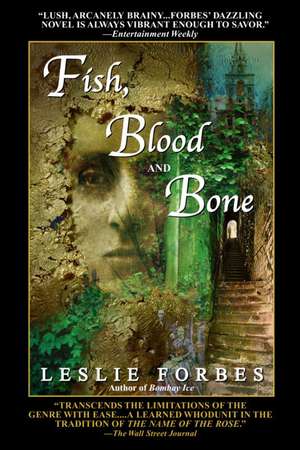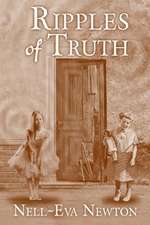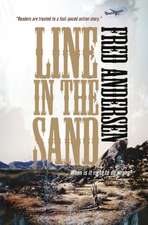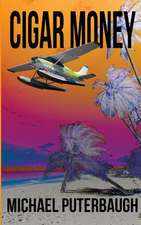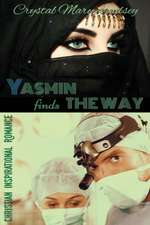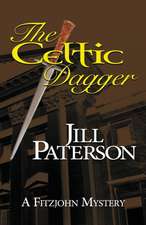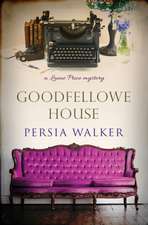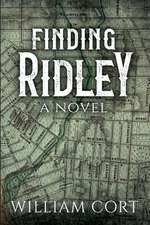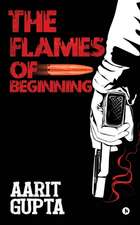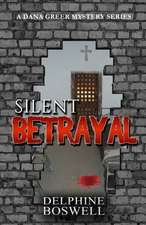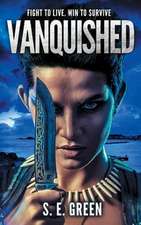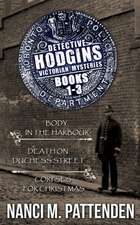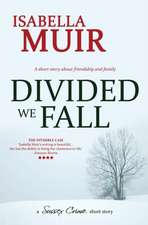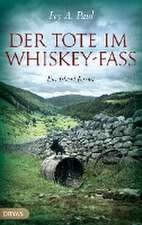Fish, Blood and Bone
Autor Leslie Forbesen Limba Engleză Paperback – 30 apr 2002
Expatriate Claire Fleetwood is a forensic photographer adept at turning the bones of the dead into silvery, telling shadows. When she inherits an estate situated in London’s East End, Claire finally feels rooted. Then one morning a friend is murdered beyond the walls of her garden--a crime that unnerves her, intrigues her, and compels her to unravel not only the mysteries of the victim’s past but her own past as well. It’s a journey that takes Claire to the India of her forebears, to a hidden paradise between Bhutan and Tibet, and to a secret history that reverberates through time, through blood, through a lineage of forbidden pleasures and harrowing implications.
A sensuous and revealing thriller like no other, Fish, Blood and Bone is an intoxicating reflection on the consequences of the past, of unearthed skeletons and family sins, played out against the most exotic landscapes on earth—and the most unsettling corners of the imagination.
Preț: 122.14 lei
Nou
Puncte Express: 183
Preț estimativ în valută:
23.37€ • 24.47$ • 19.34£
23.37€ • 24.47$ • 19.34£
Carte disponibilă
Livrare economică 17-31 martie
Preluare comenzi: 021 569.72.76
Specificații
ISBN-13: 9780553381634
ISBN-10: 0553381636
Pagini: 448
Dimensiuni: 139 x 215 x 28 mm
Greutate: 0.57 kg
Ediția:Bantam Trade Pb.
Editura: Bantam
ISBN-10: 0553381636
Pagini: 448
Dimensiuni: 139 x 215 x 28 mm
Greutate: 0.57 kg
Ediția:Bantam Trade Pb.
Editura: Bantam
Extras
It is that time of evening when the setting sun seems to rise again and saturate every color in one final luminous shower. I am lying on the grass with my arms spread like someone about to dive, or a stone angel fallen from a grave. Tower blocks loom above this cemetery of a garden, oversized tombstones in shades of gray, yet from the ground all I can see is a mosaic of green leaves and cobalt-blue sky; both colors so intense from their last benediction of light that it is impossible to tell which color is near and which is far away. Then the tree leaves begin to rush in at me. I am falling through them, diving through them, at the same time being pressed into the ground by their weight. Composted, buried under more greens than I can name or count, I loop the loop down a double spiral, one of those funfair rides that leaves you feeling sick – call it The Big Helix, a long coiling bridge or tunnel linking two stories a hundred years apart.
It began in a garden, and ends in one: Jack is dead; I killed him.
Thinking back to the night before Sally's murder, I remember trying to listen to the trees. It was one of Sal's crazier theories: concentrate hard enough and the trees' whispers will resolve into words. Another theory involved a compost invented by Rudolf Steiner. 'He said. . wait a minute ... Don't laugh. He said it had the power to reunite the earth with its severed soul".' She grinned, knowing the occult phrase sounded funny recited in her tarmacked accent. 'Good, innit?'
The only Rudolf Steiner I've heard of was a philosopher who set up a sort of alternative school system. Same guy?'
'Dunno. But my bloke was worried because the planet was sick "both in spirit and in soil" -look, I copied it into my garden book. The cure was to make a compost out of a stag's bladder stuffed with yarrow flowers, a pig's gut stuffed with dandelions, the skull of a goat filled with oak bark, a bunch of nettles wrapped in moss and a length of cow's intestine filled with chamomile?
Her language was always full of pulpy, mulching words, but at this gothic recipe I burst out laughing. "What do you do then, Sal, add an eye of newt and boil it up under a full moon? Could be pricey these days, given the cost of newts. Aren't they an endangered species?'
When I teased Sally, the ardent conservationist, the vegetarian, for her bloodthirsty soil, she told me that every butcher in London used to have a garden where they buried the stinking guts so they wouldn't cause offence, and if you tempered these with lime the result was a good fertilizer. 'The earth is hill of blood and bones: she said, 'You just can't see them now. It's all the same color.'
'Will you want to claim anonymity if you are called as a witness?' asked the detective who took my statement the morning after Sally's murder. He was a big man, uncomfortably poised on the very edge of my sofa as if he were afraid of getting dog hairs on his Stay-Prest trousers.
'What happens if I do?'
'It might mean the Crown Prosecution Service disallowing your testimony?
'Then I won't? Although if anyone could claim anonymity as a birthright, it was me. Anon: the name you see next to countless poems, paintings, Christmas carols - and crimes, anon, anon, anon.
'You're sure?' his female colleague pressed. 'You will have to stand up in court . . ? A pause before she added what none of the cops who questioned me has put in words. 'And there's no guarantee the men who did this won't get off. They'll have your name. They have your address already?
'I'm sure? The idea of my identity - of me, Claire Fleetwood being important, even dangerous, is an odd one. I am such an ordinary person. Not brave. Not at all sure that I want to face those men in court. But a public testimony seems the only way to take control of my life again. Otherwise, the men who left Sally in the street will have won. Their assessment of me that night - young, small, girl, no threat - will be correct. I'll be consigned to the big compost heap: People of No Consequence, Anon.
Since the murder my brain has been on a circular track that keeps shunting me back to that point when I went over the wall and saw... what did I see? I've told it to so many different faces whose features were arranged to imitate sympathy, appropriate sadness, whatever people think they should look like in the face of violent death. For my official witness statement I had to give a general synopsis first, then break it down stage by stage. All the details:
whether it could have been a robbery I interrupted
if she tried to defend herself
how long they hesitated after I called out
the shape of the blood running out of her
Then the cops read it back to me and I had to initial any change I'd made, a story repeated so many times that the telling has become the event. Maybe that's why the police make you do it, to fix it, the way I fix my forensic photographs with chemicals. Unless you fix them, they keep getting darker and more obscure.
'How did it happen?' The question they all ask. Could I have stopped it? The question I ask myself.
'It was dark - 10.30 on a warm April evening?
'The twentieth, that was?' asked the detective recording my statement.
'Yes. I was taking pictures of the Helleborus orientalis.'
'Hellebor-?'The policeman questioned the unfamiliar name as if it were a suspect.
'A flower, 'I told him. 'From the East.' Fleshy, dusky blooms the color of unripe plums and bruises. What was I thinking? Maybe just enjoying the pure sensuous pleasure of warm night air like a silk scarf on my skin, the smell of life in the damp earth, the fishiness of my fingers as I brought them close to my face, remnants of the Fish, Blood & Bone fertilizer I'd sprinkled on the garden, my garden. It's a new sensation for me, feeling tied to a place. For the first time in my twenty-eight years I've put down roots, and it's the physical act of digging, of literally getting dirt under my nails, that has had this effect. The recent pictures I've been taking at home reflect this new interest, a break from my daily work as a forensic photographer.
Part of my brain slides away here and tries to move a few feet down the line past the uglier pictures. Another side zooms in, adjusts the focus. The side with a different agenda, one of those ghouls who drive slowly past road accidents.
Feeling again her hand cooling in mine. Her skin turning waxy as hellebores.
A spring night. Warm on my skin, a night that smelled of broom and wet ferns. Like my brother Robin when he came back from three days' fishing. Like Sally and Mr Banerji when they came in from working in the garden, bringing a smell with them of washing hung outside to dry. I didn't put that in the statement. It's not relevant to the careful cataloguers from the CID. No one needs to know how Sally smelled when living. Her last smell was sticky and sweet. Blood and urine.
The CID man looked up from his notes. 'Where were you when you first heard the cries for help?'
'I was in the garden taking pictures. I had unscrewed the camera from the tripod to get closer, strung it around my neck for safety. The garden wall, about seven feet in height, separates me from the almshouses? And on the third side from the patch of weeds, flowers, broken bottles, used condoms and syringes that lies between the wall and the street. What Sally calls - used to call - the Front Line. I cleared my throat, as if by doing so I could clear the memories along with the unshed tears. 'Gradually I became aware that someone had been crying, calling out for help for several minutes.'
'It seems to have taken you a long time to notice:
I stared at him, working out the motive for his comment. 'Have you walked down that street? My friend - Sally - she called it the Front Line, for a good reason. It's supposed to be an extension of the back central garden belonging to the house I live in. In fact, it's not a garden, it's a battlefield where we wage war on vandals and hookers and junkies and the people who think their dog's shit smells better than my flowers?
I would have given up the first time they snapped off the climbing vines and trampled on the seedbeds. It was Sally who kept the garden going. She found the steel-blue thistles whose stems were too tough to break easily, and the rose with a name - Blanc double de Coubert - as tissuey as Sally promised its clove-scented blooms would be, with branches armoured in a thick hedge of spines. She bicycled off to a churchyard last year and took seeds from the tough old hollyhocks growing there, so that later this summer we would have a phalanx of them, marching shoulder to shoulder against the marauding hordes. Sally stored up in her head like seeds all the garden aphorisms she had ever been told. 'Mr Banerji says gardening is the art closest to giving birth: she'd say. 'But spring shouldn't get all the credit because every garden starts with a little death. Mr Banerji believes in the cycle of reincarnation. I guess I do too?
Of course, these weren't the kind of things the policeman wanted to know.
'Sally - this would be Sally Rivers, the dead girl?' he asked.
'Yes? Every garden starts with a little death. 'I thought it was just another car radio thief. I don't know when I recognized her voice, maybe at my dog's first barks? Then I was running, holding the camera against my chest to stop it bouncing. Got to the gate and heard the impact, the soft thump against it, and in that moment I realized I didn't have the keys with me. We had only just started locking the gate. I heard Sally's voice and ran down the wall to the trellis, started to climb it, the stupid suburban trellis that Sally pleaded with me to buy from the stupid garden center, still holding my camera (why didn't I drop the camera? would I have been faster, could it have made a difference if I'd dropped it?). Pulled myself over the wall and saw them: three figures, one falling, being held, fallen) an arm up to protect her face, one man holding her while the other hit. He was using this club thing, not a knife - 'A truncheon, would you call it?' the detective interrupted, and I nodded. I'd forgotten I was speaking aloud. A truncheon, that was the word. A word with a wet crunch in it.
'I shouted. The big man looked at me. He hesitated for a second. Our eyes met. Then he got on with it? No anger in his face. His job. What he does for a living. 'I slid down the side of the wall ... and then - I don't remember. They were running past me under the streetlight, two biggish men -'
'And you're how tall? Five foot two?'
'Five-one. They were well dressed, beefy. Expensive trainers? Men you could stand next to in a bar without feeling nervous. The kind of men put on this earth to protect us, the weaker sex. 'Then I heard sirens, I think. Someone called the police, the ambulance. I was holding her hand, telling her she'd be all right?’
Keep breathing, Sally, don't stop breathing. There's someone coming, Sally, you're going to be all right. And meanwhile a great petal of blood slipping past me like Sally's shadow. Sally's eyes rolling back. She's hiccuping for air. Her hand loosening, cooling, the blood getting sticky. Still no ambulance, although I see the police and I'm swearing at them, shouting for the ambulance while they pull on their latex gloves. I remember the gloves, how long it took to put them on, how thin and transparent the gloves were. 'The ambulance came. It took about twenty-five minutes, I think? By then, I couldn't tell if it was Sally's hand holding mine or mine holding hers. We were both sticky from the blood running down inside the sleeve of her plastic coat, where she'd held up her arm to stop them hitting her face.
All the time my dog Russell was barking and barking. I could hear him scratching at the garden gate, then throwing the full weight of his terrier body against it. Sally was his friend too. She saved bones and toast corners for him.
They took her away. I made the nicest policeman promise to tell me what happened to her. But he didn't. I was just a friend, not family. Other things on his mind. I didn't hear what happened until the next morning at six when I went out to see the street blocked off with yellow tape. By then it was murder.
She died in the early morning of the twenty-first of April, a few hours after getting to Emergency. A small girl. Aged eighteen, about my height, puny, not the product of weekly feedings and mulchings during her prime growth period. She had multiple stab wounds in her side, a broken arm where the truncheon blows had missed her head, several broken ribs. Her head was smashed in and her left hand, the one she wasn't holding up to protect her face, was pierced through the palm. She was holding on to the rose, they said. It troubled me that she'd died before it flowered. Clove-scented, she'd promised.
'I should have stopped them; I said to the CID man.
He shook his head. 'She'd been stabbed before she got to your gate. We found traces of blood around the corner and smeared along the cars where she'd staggered into them. The stab wounds alone would've killed her, let alone the blows they used to finish her off?
'I should have gone with her?
'Nah - it's amazing she lived as long as she did?
I wasn't amazed. She was a small girl, but tough as weeds.
After the forensic people had completed their work that day, they hosed down the scene. I guess the blood wasn't a good advertisement for our neighborhood, which the council claims to have cleaned up. The police clean-up job was just as inadequate. A pale red stain remained, like the watercolor of a fallen petal. Beside it was one of the policemen's crumpled latex gloves, the thumb poking out from under an empty cigarette pack so I thought at first that the glove was a discarded condom. We get a lot of those tossed into the bushes around here. Now I can't seem to get rid of that collage - the bloodstain and the latex. The seventeen stab wounds in Sally linked to a different form of penetration.
It began in a garden, and ends in one: Jack is dead; I killed him.
Thinking back to the night before Sally's murder, I remember trying to listen to the trees. It was one of Sal's crazier theories: concentrate hard enough and the trees' whispers will resolve into words. Another theory involved a compost invented by Rudolf Steiner. 'He said. . wait a minute ... Don't laugh. He said it had the power to reunite the earth with its severed soul".' She grinned, knowing the occult phrase sounded funny recited in her tarmacked accent. 'Good, innit?'
The only Rudolf Steiner I've heard of was a philosopher who set up a sort of alternative school system. Same guy?'
'Dunno. But my bloke was worried because the planet was sick "both in spirit and in soil" -look, I copied it into my garden book. The cure was to make a compost out of a stag's bladder stuffed with yarrow flowers, a pig's gut stuffed with dandelions, the skull of a goat filled with oak bark, a bunch of nettles wrapped in moss and a length of cow's intestine filled with chamomile?
Her language was always full of pulpy, mulching words, but at this gothic recipe I burst out laughing. "What do you do then, Sal, add an eye of newt and boil it up under a full moon? Could be pricey these days, given the cost of newts. Aren't they an endangered species?'
When I teased Sally, the ardent conservationist, the vegetarian, for her bloodthirsty soil, she told me that every butcher in London used to have a garden where they buried the stinking guts so they wouldn't cause offence, and if you tempered these with lime the result was a good fertilizer. 'The earth is hill of blood and bones: she said, 'You just can't see them now. It's all the same color.'
'Will you want to claim anonymity if you are called as a witness?' asked the detective who took my statement the morning after Sally's murder. He was a big man, uncomfortably poised on the very edge of my sofa as if he were afraid of getting dog hairs on his Stay-Prest trousers.
'What happens if I do?'
'It might mean the Crown Prosecution Service disallowing your testimony?
'Then I won't? Although if anyone could claim anonymity as a birthright, it was me. Anon: the name you see next to countless poems, paintings, Christmas carols - and crimes, anon, anon, anon.
'You're sure?' his female colleague pressed. 'You will have to stand up in court . . ? A pause before she added what none of the cops who questioned me has put in words. 'And there's no guarantee the men who did this won't get off. They'll have your name. They have your address already?
'I'm sure? The idea of my identity - of me, Claire Fleetwood being important, even dangerous, is an odd one. I am such an ordinary person. Not brave. Not at all sure that I want to face those men in court. But a public testimony seems the only way to take control of my life again. Otherwise, the men who left Sally in the street will have won. Their assessment of me that night - young, small, girl, no threat - will be correct. I'll be consigned to the big compost heap: People of No Consequence, Anon.
Since the murder my brain has been on a circular track that keeps shunting me back to that point when I went over the wall and saw... what did I see? I've told it to so many different faces whose features were arranged to imitate sympathy, appropriate sadness, whatever people think they should look like in the face of violent death. For my official witness statement I had to give a general synopsis first, then break it down stage by stage. All the details:
whether it could have been a robbery I interrupted
if she tried to defend herself
how long they hesitated after I called out
the shape of the blood running out of her
Then the cops read it back to me and I had to initial any change I'd made, a story repeated so many times that the telling has become the event. Maybe that's why the police make you do it, to fix it, the way I fix my forensic photographs with chemicals. Unless you fix them, they keep getting darker and more obscure.
'How did it happen?' The question they all ask. Could I have stopped it? The question I ask myself.
'It was dark - 10.30 on a warm April evening?
'The twentieth, that was?' asked the detective recording my statement.
'Yes. I was taking pictures of the Helleborus orientalis.'
'Hellebor-?'The policeman questioned the unfamiliar name as if it were a suspect.
'A flower, 'I told him. 'From the East.' Fleshy, dusky blooms the color of unripe plums and bruises. What was I thinking? Maybe just enjoying the pure sensuous pleasure of warm night air like a silk scarf on my skin, the smell of life in the damp earth, the fishiness of my fingers as I brought them close to my face, remnants of the Fish, Blood & Bone fertilizer I'd sprinkled on the garden, my garden. It's a new sensation for me, feeling tied to a place. For the first time in my twenty-eight years I've put down roots, and it's the physical act of digging, of literally getting dirt under my nails, that has had this effect. The recent pictures I've been taking at home reflect this new interest, a break from my daily work as a forensic photographer.
Part of my brain slides away here and tries to move a few feet down the line past the uglier pictures. Another side zooms in, adjusts the focus. The side with a different agenda, one of those ghouls who drive slowly past road accidents.
Feeling again her hand cooling in mine. Her skin turning waxy as hellebores.
A spring night. Warm on my skin, a night that smelled of broom and wet ferns. Like my brother Robin when he came back from three days' fishing. Like Sally and Mr Banerji when they came in from working in the garden, bringing a smell with them of washing hung outside to dry. I didn't put that in the statement. It's not relevant to the careful cataloguers from the CID. No one needs to know how Sally smelled when living. Her last smell was sticky and sweet. Blood and urine.
The CID man looked up from his notes. 'Where were you when you first heard the cries for help?'
'I was in the garden taking pictures. I had unscrewed the camera from the tripod to get closer, strung it around my neck for safety. The garden wall, about seven feet in height, separates me from the almshouses? And on the third side from the patch of weeds, flowers, broken bottles, used condoms and syringes that lies between the wall and the street. What Sally calls - used to call - the Front Line. I cleared my throat, as if by doing so I could clear the memories along with the unshed tears. 'Gradually I became aware that someone had been crying, calling out for help for several minutes.'
'It seems to have taken you a long time to notice:
I stared at him, working out the motive for his comment. 'Have you walked down that street? My friend - Sally - she called it the Front Line, for a good reason. It's supposed to be an extension of the back central garden belonging to the house I live in. In fact, it's not a garden, it's a battlefield where we wage war on vandals and hookers and junkies and the people who think their dog's shit smells better than my flowers?
I would have given up the first time they snapped off the climbing vines and trampled on the seedbeds. It was Sally who kept the garden going. She found the steel-blue thistles whose stems were too tough to break easily, and the rose with a name - Blanc double de Coubert - as tissuey as Sally promised its clove-scented blooms would be, with branches armoured in a thick hedge of spines. She bicycled off to a churchyard last year and took seeds from the tough old hollyhocks growing there, so that later this summer we would have a phalanx of them, marching shoulder to shoulder against the marauding hordes. Sally stored up in her head like seeds all the garden aphorisms she had ever been told. 'Mr Banerji says gardening is the art closest to giving birth: she'd say. 'But spring shouldn't get all the credit because every garden starts with a little death. Mr Banerji believes in the cycle of reincarnation. I guess I do too?
Of course, these weren't the kind of things the policeman wanted to know.
'Sally - this would be Sally Rivers, the dead girl?' he asked.
'Yes? Every garden starts with a little death. 'I thought it was just another car radio thief. I don't know when I recognized her voice, maybe at my dog's first barks? Then I was running, holding the camera against my chest to stop it bouncing. Got to the gate and heard the impact, the soft thump against it, and in that moment I realized I didn't have the keys with me. We had only just started locking the gate. I heard Sally's voice and ran down the wall to the trellis, started to climb it, the stupid suburban trellis that Sally pleaded with me to buy from the stupid garden center, still holding my camera (why didn't I drop the camera? would I have been faster, could it have made a difference if I'd dropped it?). Pulled myself over the wall and saw them: three figures, one falling, being held, fallen) an arm up to protect her face, one man holding her while the other hit. He was using this club thing, not a knife - 'A truncheon, would you call it?' the detective interrupted, and I nodded. I'd forgotten I was speaking aloud. A truncheon, that was the word. A word with a wet crunch in it.
'I shouted. The big man looked at me. He hesitated for a second. Our eyes met. Then he got on with it? No anger in his face. His job. What he does for a living. 'I slid down the side of the wall ... and then - I don't remember. They were running past me under the streetlight, two biggish men -'
'And you're how tall? Five foot two?'
'Five-one. They were well dressed, beefy. Expensive trainers? Men you could stand next to in a bar without feeling nervous. The kind of men put on this earth to protect us, the weaker sex. 'Then I heard sirens, I think. Someone called the police, the ambulance. I was holding her hand, telling her she'd be all right?’
Keep breathing, Sally, don't stop breathing. There's someone coming, Sally, you're going to be all right. And meanwhile a great petal of blood slipping past me like Sally's shadow. Sally's eyes rolling back. She's hiccuping for air. Her hand loosening, cooling, the blood getting sticky. Still no ambulance, although I see the police and I'm swearing at them, shouting for the ambulance while they pull on their latex gloves. I remember the gloves, how long it took to put them on, how thin and transparent the gloves were. 'The ambulance came. It took about twenty-five minutes, I think? By then, I couldn't tell if it was Sally's hand holding mine or mine holding hers. We were both sticky from the blood running down inside the sleeve of her plastic coat, where she'd held up her arm to stop them hitting her face.
All the time my dog Russell was barking and barking. I could hear him scratching at the garden gate, then throwing the full weight of his terrier body against it. Sally was his friend too. She saved bones and toast corners for him.
They took her away. I made the nicest policeman promise to tell me what happened to her. But he didn't. I was just a friend, not family. Other things on his mind. I didn't hear what happened until the next morning at six when I went out to see the street blocked off with yellow tape. By then it was murder.
She died in the early morning of the twenty-first of April, a few hours after getting to Emergency. A small girl. Aged eighteen, about my height, puny, not the product of weekly feedings and mulchings during her prime growth period. She had multiple stab wounds in her side, a broken arm where the truncheon blows had missed her head, several broken ribs. Her head was smashed in and her left hand, the one she wasn't holding up to protect her face, was pierced through the palm. She was holding on to the rose, they said. It troubled me that she'd died before it flowered. Clove-scented, she'd promised.
'I should have stopped them; I said to the CID man.
He shook his head. 'She'd been stabbed before she got to your gate. We found traces of blood around the corner and smeared along the cars where she'd staggered into them. The stab wounds alone would've killed her, let alone the blows they used to finish her off?
'I should have gone with her?
'Nah - it's amazing she lived as long as she did?
I wasn't amazed. She was a small girl, but tough as weeds.
After the forensic people had completed their work that day, they hosed down the scene. I guess the blood wasn't a good advertisement for our neighborhood, which the council claims to have cleaned up. The police clean-up job was just as inadequate. A pale red stain remained, like the watercolor of a fallen petal. Beside it was one of the policemen's crumpled latex gloves, the thumb poking out from under an empty cigarette pack so I thought at first that the glove was a discarded condom. We get a lot of those tossed into the bushes around here. Now I can't seem to get rid of that collage - the bloodstain and the latex. The seventeen stab wounds in Sally linked to a different form of penetration.
Recenzii
“Beguiling entertainment.”
--The Washington Post
“Gripping from the outset...a dizzying tale of murder and family mystery.”
--Publishers Weekly
“FORBES’ dense, descriptive prose creates a fecund atmosphere perfect for the unraveling of long-kept secrets.”
--Harper’s Magazine
“An intelligent, breathlessly paced thriller...a cracking good read.”
--Time Out New York
--The Washington Post
“Gripping from the outset...a dizzying tale of murder and family mystery.”
--Publishers Weekly
“FORBES’ dense, descriptive prose creates a fecund atmosphere perfect for the unraveling of long-kept secrets.”
--Harper’s Magazine
“An intelligent, breathlessly paced thriller...a cracking good read.”
--Time Out New York
Descriere
When Claire Fleetwood--an American forensic photographer--inherits a large house in London, she imagines it will be a slice of the English dream. But after the brutal murder of her best friend, her search to find the killer takes her across two continents.
